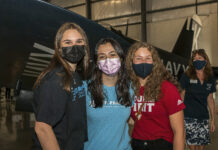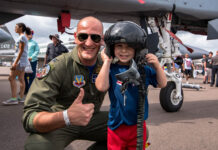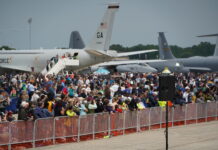In the days and weeks following the events in Washington and New York, our entire industry struggled to reestablish its balance and bearings. We all discovered first-hand that the secondary and tertiary effects of the terrorist attacks were less horrific, but perhaps even more extensive than the attacks themselves. For many, carefully developed plans, well-considered contingencies and a whole lot of hard work were lost in the relative blink of an eye.
So, now what?
There will be a small group of air show professionals who will have difficulty continuing their air show businesses as a result of late-season air show cancellations. But, for those who do, there are growing indications that the 2002 air show season could be the strongest in a decade for our industry. A few early indicators:
- Though many shows were forced to cancel their events in the days and weeks following September’s terrorist attacks, the shows that went on as scheduled attracted big crowds. In Bessemer, Alabama; Tucumcari, New Mexico; Great Bend, Kansas; and Marysville, California, air shows attracted record or near-record crowds. But it wasn’t just the small shows. Fort Worth, Houston, Lafayette, Jacksonville and Daytona all staged very successful events that will likely set the tone and expectations for the first air shows of the 2002 season.
- The military is planning to provide normal levels of aircraft support to air shows next season. Operational priorities could intercede between now and then, but the U.S. and Canadian military are currently planning full schedules for their jet teams and their single ship demonstration teams.
- Participation in the upcoming ICAS Convention, one important indicator of air show industry confidence in the 2002 air show season, remains strong. By early November, convention registrations were still 26 percent higher than 2001. The exhibit hall is once again sold out. And the hotel reports that ICAS members have reserved 88 percent of our very large room block.
- Air shows held late in the 2001 season and past experience both suggest that air show attendance could increase significantly for the 2002 season. Public expressions of patriotism since the terrorist attacks produced huge crowds at a number of post-September 11 shows. Air show veterans are predicting that the public will want to get an up-close look at the military aircraft that will be operating in and around Afghanistan during the coming months. Travel experts are already predicting that the public will want to stay closer to home during times of uncertainty. At a time when many families may be struggling financially, the entertainment value that air shows continue to offer is likely to be even more attractive than ever. All of this translates to larger air show audiences in 2002.
- ICAS has been in touch with regulatory officials in both the United States and Canada. The vast majority of airspace issues have already been addressed and the remaining issues will be worked out before the end of this season. Rumors about significant changes to air show security requirements are baseless and exaggerated. The rules under which we operate shows may change, but not that much.
Every show, every performer and every support service provider is going to have to make up his or her own mind about how the events of September 11 will influence the 2002 air show season. We recommend cautious optimism. There’s limited information on which to make some of the decisions that need to be made in the next several weeks, but the few indicators we’ve got are positive.








